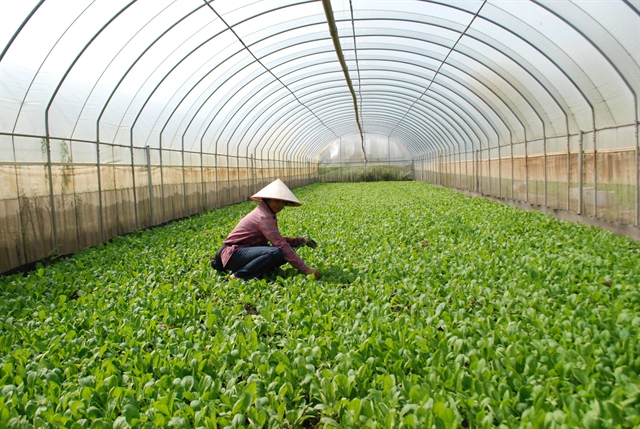 Society
Society


|
| An organic farm of Cuối Quý hi-tech organic vegetable co-operative in Hà Nội's Đan Phượng District. — Photo nongnghiephuucovn.vn |
HÀ NỘI — The COVID-19 pandemic and negative impacts of climate changes have piled pressure on the Cuối Quý hi-tech organic vegetable co-operative in Hà Nội's Đan Phượng District.
Đặng Thị Cuối, director of the co-operative, said the co-operative was in need of capital to maintain and expand agricultural production.
However, it was difficult for them to access preferential bank loans, either because of a lack of guarantee conditions or high interest rates. Other organisations also offered preferential interest rates but the loans were limited, Cuối said.
Organic Green Clean Food Company Limited was appointed by Hà Nội People's Committee to develop clean food production and supply chains, but a shortage of investment was a major problem for the company.
Nguyễn Văn Chữ, director of the company, said that building a clean supply chain required large funding, up to five times higher than other enterprises in the same field.
Specifically, in order to have proper supply of clean animal feed, it was necessary to build a production plant with an investment capital of VNĐ35-50 billion, a standard cattle slaughterhouse worth VNĐ20 billion plus other funding to build professional farms.
However, Chữ's company has been unable to access preferential loans and had to borrow money with property as collateral.
"This year, the credit room is tight, so the loan source is tighter. For example, previously with a house mortgage, his company was able to borrow VNĐ5 billion, but now only VNĐ3 billion," said Chữ.
Nguyễn Tiến Định, an official from the Department of Economic Co-operation and Rural Development under the Ministry of Agriculture and Rural Development, said that the whole city now had 18,795 agricultural co-operatives, accounting for 70 per cent of the total number of cooperatives nationwide, attracting 3.2 million members.
Of those, about 2,000 agricultural co-operatives are using high technology, more than 1,000 cooperatives are participating in One Commune One Product (OCOP) programme, while 37 per cent of the co-operatives link agricultural products consumption for farmers.
Only about 7,000 cooperatives are supported by credit funds and 3.7 per cent have access to credit annually. Total outstanding loans of agricultural co-operatives by 2021 reached VNĐ6 trillion.
"This is a modest number as each year, only about 45 agricultural cooperatives receive preferential credit from the development fund," Định said.
Due to difficulties in accessing preferential loans from the commercial banking system, co-operatives are not able to invest in processing. As a result, they could only focus on collecting products. Their productivity and business efficiency were low, putting pressure on businesses to link up or limiting the formation and development of linkage chains, Định said.
In particular, the limited access to bank loans made businesses fall into a "credit trap” or force them to take on “black credit” in rural areas, Định said.
Director of Bình Thành Agricultural Service Cooperative in the southern province of Đồng Tháp Lưu Văn Bút said that the State Bank of Việt Nam should study and allow local banks to appraise the actual performance of local co-operatives.
In addition, more policies and documents guiding the implementation of lending was needed so that co-operatives could access credit from banks.
Director of Organic Green Clean Food Co., Ltd. Nguyễn Văn Chữ suggested that the State should pay attention to the development of linkage chains with specific credit lines and loan borrowing mechanisms.
Định from the Department of Economic Co-operation and Rural Development also suggested that the authorities should amend the decree on internal credit which regulated the minimum capital contribution of cooperative members.
Commercial banks need to develop credit policies for co-operatives, especially credit packages to help farmers leave the "trap" of black credit; encourage investment for cooperatives to expand business and form a large internal production chain.
"The Ministry of Agriculture and Rural Development is planning to direct investment in logistics centres and storage yards for co-operatives. The ministry is also carrying out projects to support raw material areas, increasing investment for cooperatives.
Regarding the issue of improving the management and operation capacity of co-operatives, Director of An Mỹ Community-Based Agriculture and Tourism Co-operative in the central province of Phú Yên Nguyễn Thị Thanh Thủy called for training classes for managers and directors of co-operatives to equip them with proper understanding of financial and accounting issues.
They then would develop more specific business plans to access capital quickly and effectively, Thủy said. — VNS